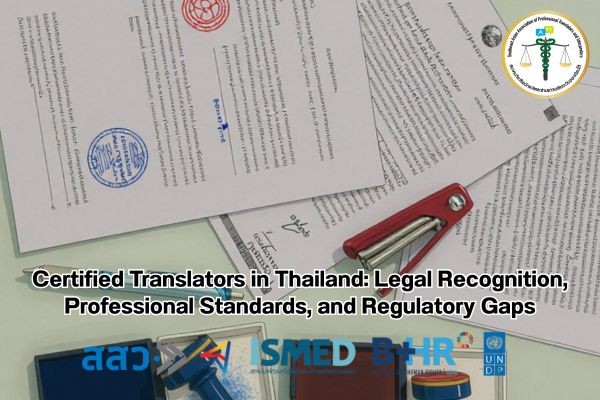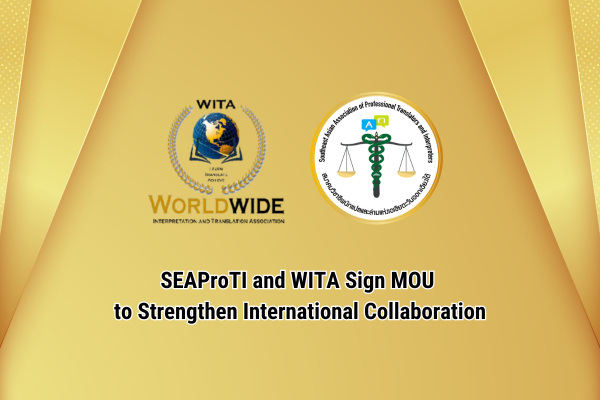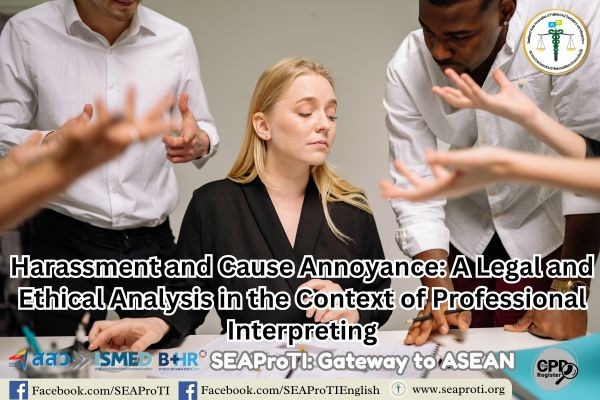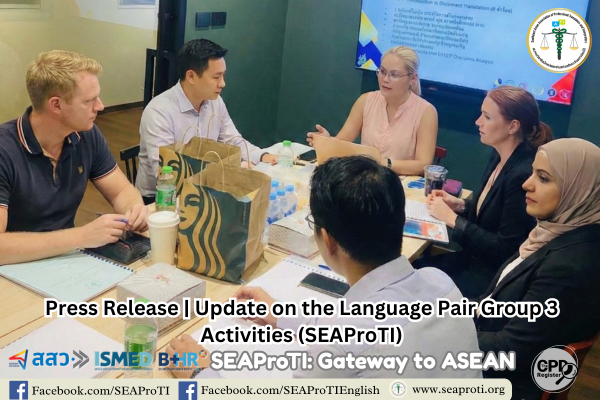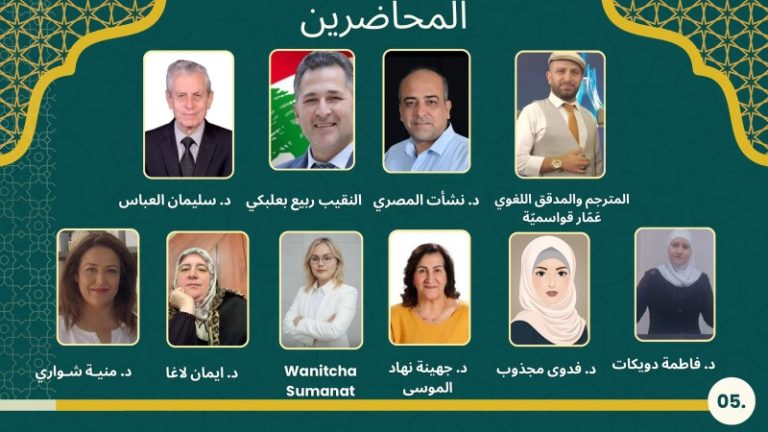Certified Translators in Thailand: Legal Recognition, Professional Standards, and Regulatory Gaps
June 29, 2025, Bangkok – In Thailand, certified translations are crucial for legal, academic, and governmental processes. However, the country lacks a centralized licensing authority for translators, creating inconsistencies in how certification is interpreted and applied. This article examines the definition and function of certified translations in Thailand, the roles of professional associations such as the Southeast Asian Association of Professional Translators and Interpreters (SEAProTI), and the risks associated with unregulated or falsely claimed certifications. This article also addresses the process of legalization by the Ministry of Foreign Affairs and identifies six exemplary certified translation agencies across the country.
1. Introduction
Certified translation plays a crucial role in ensuring the accuracy, legality, and acceptance of multilingual documents in governmental, judicial, academic, and commercial settings (Pym, 2009). In Thailand, despite the widespread use of certified translations, there remains legal ambiguity regarding who qualifies as a “certified translator.” This article explores the existing frameworks and professional standards while identifying challenges and best practices.
2. What Constitutes a Certified Translation in Thailand?
A certified translation in the Thai context refers to a document translated from one language to another that includes a formal declaration from the translator or translation agency. This declaration affirms the translation’s accuracy and completeness and is usually accompanied by the translator’s signature, seal, and contact information (SEAProTI, 2023). Such documents are often required by courts, immigration offices, universities, and international embassies.
3. Certifying Bodies and the Role of SEAProTI
Unlike many European jurisdictions that require sworn or court-certified translators (Katschinka, 2014), Thailand does not maintain a national registry of licensed translators. Instead, two unofficial but commonly recognized forms of certification prevail:
- Translators whose work is consistently accepted by the Ministry of Foreign Affairs (MFA), particularly the Department of Consular Affairs.
- Translators certified by professional bodies, especially the Southeast Asian Association of Professional Translators and Interpreters (SEAProTI).
- SEAProTI plays a central role in setting ethical and professional standards. Its certification process includes rigorous testing of linguistic, legal, and ethical competencies (SEAProTI, 2023).
4. Legalization Requirements
For certified translations to be used abroad, further legalization by the MFA is often necessary. This step involves the Ministry verifying the authenticity of both the original document and the translation. While the MFA does not directly certify translators, it plays a key role in the translation validation ecosystem (Ministry of Foreign Affairs, Thailand, 2022).
5. Risks of Misrepresentation
A recurring issue in Thailand is the proliferation of translators and agencies falsely claiming to be “certified by the MFA.” As confirmed by the Ministry, the Department of Consular Affairs does not authorize or license translation professionals (Ministry of Foreign Affairs, 2022). Clients using such services may risk document rejection, legal disputes, or delays. SEAProTI has issued public warnings about this misrepresentation and encourages public institutions to adopt stricter vetting procedures.
6. Case Study: Six Leading Agencies
This section highlights six exemplary translation agencies recognized for providing certified translation services in Thailand:
- Phothong Translation (Ubon Ratchathani) – Specializes in immigration and legal documents; SEAProTI-certified.
- Ideal Partner Group (Loei) – Known for legal and business translations; offers multilingual support.
- NS Translation Services (Chiang Mai) – Offers academic, legal, and notarized translations with professional oversight.
- Hub of Language Co., Ltd. (Nonthaburi) – Focuses on immigration, consular, and educational translations.
- Language Institute, Hatyai University (Hat Yai) – Academic translation specialist serving southern Thailand.
- Baan Ajarn Mark (Surin) – Provides certified multilingual services for rural clients with international needs.
These agencies represent best practices in certified translation and are notable for their adherence to SEAProTI standards.
7. Policy Implications and Recommendations
Thailand’s translation industry would benefit from formal recognition of certified translators through legislation or ministerial regulation. A national registry, aligned with SEAProTI certification, would enhance accountability and reduce fraud. In the interim, institutional reliance on SEAProTI as the de facto certifying authority offers a workable standard for legal and diplomatic acceptance.
8. Conclusion
In the absence of a unified state framework, certified translation in Thailand depends on professional self-regulation and recognition by administrative authorities. SEAProTI fills a critical gap by offering a standardized certification system. Nonetheless, public education, legal reform, and inter-agency cooperation are essential to ensure transparency, professional accountability, and global compatibility in Thai translation practices.
References:
- Katschinka, L. (2014). The need for a legal framework for translation and interpreting in the EU. International Federation of Translators.
- Ministry of Foreign Affairs, Thailand. (2022). Guidelines for legalizing foreign documents. Retrieved from https://www.consular.go.th
- Pym, A. (2009). Using process studies in translator training: Self-discovery through lousy translations. In The Interpreter and Translator Trainer, 3(2), 167–184.
- SEAProTI. (2023). Certified Translator Program: Standards and Practices. Southeast Asian Association of Professional Translators and Interpreters. Retrieved from https://www.seaproti.org
SEAProTI’s certified translators, translation certification providers, and certified interpreters:
The Southeast Asian Association of Professional Translators and Interpreters (SEAProTI) has officially announced the criteria and qualifications for individuals to register as “Certified Translators,” “Translation Certification Providers,” and “Certified Interpreters” under the association’s regulations. These guidelines are detailed in Sections 9 and 10 of the Royal Thai Government Gazette, issued by the Secretariat of the Cabinet under the Office of the Prime Minister of the Kingdom of Thailand, dated July 25, 2024, Volume 141, Part 66 Ng, Page 100.
To read the full publication, visit: the Royal Thai Government Gazette
นักแปลรับรองในประเทศไทย: การรับรองตามกฎหมาย มาตรฐานวิชาชีพ และช่องว่างเชิงนโยบาย
29 มิถุนายน 2568, กรุงเทพมหานคร – การแปลรับรองมีบทบาทสำคัญในประเทศไทย โดยเฉพาะในกระบวนการทางกฎหมาย การศึกษา และการติดต่อกับหน่วยงานภาครัฐ แม้การใช้งานจะเป็นที่แพร่หลาย แต่ประเทศไทยยังไม่มีหน่วยงานกลางที่ควบคุมหรือนิยามผู้ที่มีคุณสมบัติเป็น “นักแปลรับรอง” อย่างชัดเจน บทความนี้มุ่งศึกษาความหมายของการแปลรับรองในบริบทของประเทศไทย บทบาทของสมาคมวิชาชีพ เช่น สมาคมนักแปลและล่ามแห่งเอเชียตะวันออกเฉียงใต้ (SEAProTI) รวมถึงความเสี่ยงจากการแอบอ้างรับรองโดยไม่มีหลักฐานที่แท้จริง ทั้งนี้ยังกล่าวถึงกระบวนการรับรองเอกสารโดยกระทรวงการต่างประเทศ และแนะนำหน่วยงานแปลรับรองที่มีมาตรฐานในประเทศไทย
1. บทนำ
การแปลรับรองมีบทบาทสำคัญในการรับรองความถูกต้องตามกฎหมายของเอกสารภาษาต่างประเทศ โดยเฉพาะในกรณีที่เกี่ยวข้องกับการยื่นต่อศาล ราชการ สถานทูต หรือมหาวิทยาลัย (Pym, 2009) อย่างไรก็ตาม ในประเทศไทยยังไม่มีข้อกฎหมายที่ระบุชัดเจนว่าใครสามารถเป็น “นักแปลรับรอง” ได้ บทความนี้จึงเสนอการสำรวจระบบที่มีอยู่ มาตรฐานวิชาชีพ และปัญหาเชิงนโยบายในปัจจุบัน
2. การแปลรับรองในประเทศไทยคืออะไร
ในประเทศไทย การแปลรับรองหมายถึงเอกสารที่ได้รับการแปลโดยนักแปลหรือหน่วยงานแปล พร้อมแนบคำรับรองว่าเนื้อหาการแปลนั้นถูกต้องและสมบูรณ์ โดยจะมีลายเซ็นตราประทับ และข้อมูลติดต่อของผู้แปลกำกับไว้ (SEAProTI, 2023) เอกสารลักษณะนี้มักใช้ในกรณี:
- ยื่นต่อศาลหรือหน่วยงานราชการ
- ใช้ในกระบวนการขอวีซ่า
- สมัครงานหรือศึกษาต่อในต่างประเทศ
3. หน่วยงานรับรอง และบทบาทของ SEAProTI
ต่างจากประเทศในสหภาพยุโรปซึ่งมีระบบนักแปลสาบานตน (sworn translator) ประเทศไทยยังไม่มีระบบทะเบียนนักแปลรับรองแห่งชาติ (Katschinka, 2014) อย่างไรก็ตาม มีสองแนวทางที่ถือว่า “ได้รับการรับรอง” ในทางปฏิบัติ ได้แก่:
- นักแปลที่มีผลงานผ่านการรับรองโดย กรมการกงสุล กระทรวงการต่างประเทศ
- นักแปลที่ได้รับ การรับรองจากสมาคมวิชาชีพ เช่น SEAProTI
SEAProTI มีบทบาทสำคัญในการกำหนดมาตรฐานคุณภาพ จรรยาบรรณ และการสอบคัดเลือกเพื่อรับรองนักแปลวิชาชีพในระดับนานาชาติ (SEAProTI, 2023)
4. การรับรองโดยกระทรวงการต่างประเทศ
ในการใช้งานเอกสารแปลในต่างประเทศ การแปลรับรองยังต้องผ่านการ “รับรองเอกสาร” (Legalization) จากกระทรวงการต่างประเทศ ซึ่งเป็นกระบวนการตรวจสอบความถูกต้องของต้นฉบับและการแปล โดยแม้กระทรวงฯ จะไม่ออกใบรับรองให้กับนักแปลรายใดโดยตรง แต่ก็เป็นกลไกสำคัญในการรับรองความน่าเชื่อถือของเอกสาร (กระทรวงการต่างประเทศ, 2565)
5. ความเสี่ยงจากการแอบอ้าง
ปัญหาที่พบอย่างต่อเนื่อง คือการที่นักแปลหรือบริษัทแปลบางราย แอบอ้างว่าได้รับการรับรองจากกระทรวงการต่างประเทศ ทั้งที่ในความเป็นจริง กรมการกงสุลไม่มีอำนาจออกใบรับรองนักแปล การใช้บริการจากผู้แอบอ้างเช่นนี้อาจส่งผลให้เอกสารถูกปฏิเสธ หรือมีปัญหาทางกฎหมายในภายหลัง (กระทรวงการต่างประเทศ, 2565; SEAProTI, 2023)
6. กรณีศึกษา: หน่วยงานแปลรับรอง 6 แห่งในประเทศไทย
รายชื่อหน่วยงานแปลรับรองที่ได้รับความเชื่อถือในด้านมาตรฐานวิชาชีพและการปฏิบัติตามแนวทางของ SEAProTI ได้แก่:
- Phothong Translation (อุบลราชธานี) – เชี่ยวชาญด้านเอกสารตรวจประวัติและวีซ่า
- Ideal Partner Group (เลย) – ให้บริการแปลเอกสารกฎหมาย ธุรกิจ และส่วนบุคคล
- NS Translation Services (เชียงใหม่) – เชี่ยวชาญด้านเอกสารการศึกษาและนิติกรรม
- Hub of Language (นนทบุรี) – แปลเอกสารสำหรับสถานทูตและสำนักงานตรวจคนเข้าเมือง
- สถาบันภาษา มหาวิทยาลัยหาดใหญ่ (สงขลา) – เน้นการแปลเอกสารทางวิชาการ
- บ้านอาจารย์มาร์ค (สุรินทร์) – ให้บริการแปลภาษาหลายภาษาในพื้นที่ชนบท
7. ข้อเสนอเชิงนโยบาย
ประเทศไทยควรมีระบบทะเบียนนักแปลรับรองระดับชาติ ที่อิงจากมาตรฐาน SEAProTI และร่วมมือกับหน่วยงานรัฐในการกำกับดูแล การยกระดับวิชาชีพแปลในลักษณะนี้จะช่วยลดปัญหาการแอบอ้าง และส่งเสริมความน่าเชื่อถือของเอกสารในระดับสากล
8. สรุป
ในขณะที่ประเทศไทยยังไม่มีกรอบกฎหมายที่ชัดเจนสำหรับนักแปลรับรอง กลไกวิชาชีพของ SEAProTI จึงกลายเป็นมาตรฐานกลางที่ได้รับการยอมรับทั้งภายในและต่างประเทศ การสร้างระบบรับรองระดับชาติ และการกำกับดูแลที่เข้มแข็ง จะช่วยยกระดับมาตรฐานวิชาชีพ และป้องกันการใช้บริการแปลที่ไม่ถูกต้องตามหลักกฎหมาย
อ้างอิง:
- กระทรวงการต่างประเทศ. (2565). แนวทางการรับรองเอกสาร. สืบค้นจาก https://www.consular.go.th
- Katschinka, L. (2014). The need for a legal framework for translation and interpreting in the EU. International Federation of Translators.
- Pym, A. (2009). Using process studies in translator training: Self-discovery through lousy translations. The Interpreter and Translator Trainer, 3(2), 167–184.
- SEAProTI. (2023). Certified Translator Program: Standards and Practices. สมาคมนักแปลและล่ามแห่งเอเชียตะวันออกเฉียงใต้. สืบค้นจาก https://www.seaproti.org
เกี่ยวกับนักแปลรับรอง ผู้รับรองการแปล และล่ามรับรองของสมาคมวิชาชีพนักแปลและล่ามแห่งเอเชียตะวันออกเฉียงใต้
สมาคมวิชาชีพนักแปลและล่ามแห่งเอเชียตะวันออกเฉียงใต้ (SEAProTI) ได้ประกาศหลักเกณฑ์และคุณสมบัติผู้ที่ขึ้นทะเบียนเป็น “นักแปลรับรอง (Certified Translators) และผู้รับรองการแปล (Translation Certification Providers) และล่ามรับรอง (Certified Interpreters)” ของสมาคม หมวดที่ 9 และหมวดที่ 10 ในราชกิจจานุเบกษา ของสำนักเลขาธิการคณะรัฐมนตรี ในสำนักนายกรัฐมนตรี แห่งราชอาณาจักรไทย ลงวันที่ 25 ก.ค. 2567 เล่มที่ 141 ตอนที่ 66 ง หน้า 100 อ่านฉบับเต็มได้ที่: นักแปลรับรอง ผู้รับรองการแปล และล่ามรับรอง


